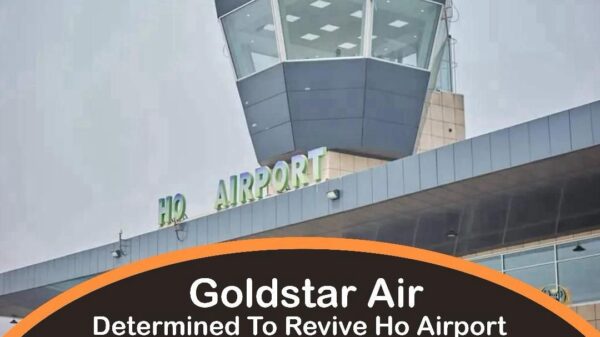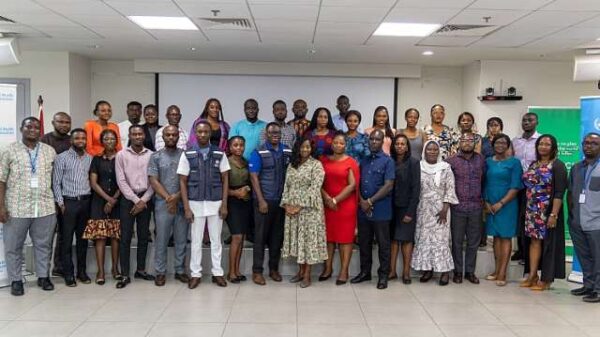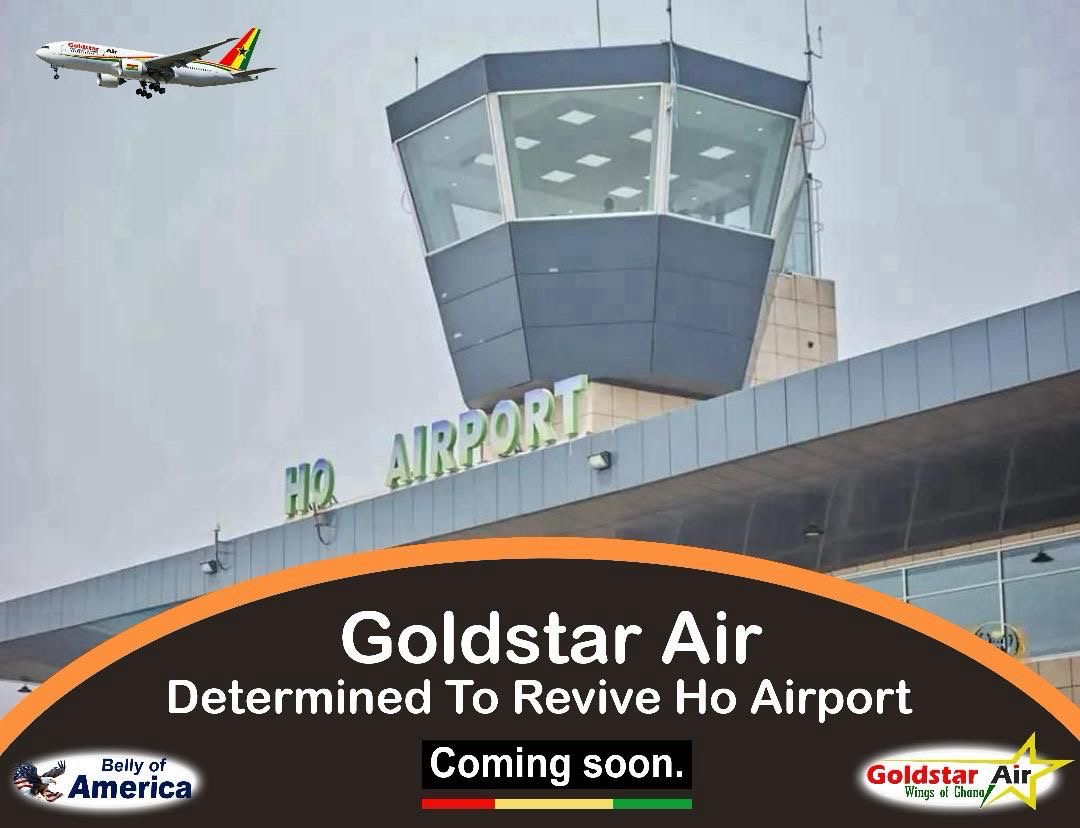 International airline Goldstar Air, a private Ghanaian and United States registered company with an issued Air Carrier Licence (ACL/N-SCH No. 0239) from the Ghana Civil Aviation Authority (GCAA) to operate passenger and cargo flights across West Africa and intercontinental routes, is determined to revive Ho Airport (HZO), previously classified as a ghost town to become a hub for cargo, tourism, and industrial zone. This initiative is expected to boost economic growth in Ghana’s Volta Region and contribute immensely towards the airline’s ambitious, but achievable Project $1 Trillion foreign reserves. The successful revival of Ho Airport will serve as a model for other underutilized airports across Ghana.
International airline Goldstar Air, a private Ghanaian and United States registered company with an issued Air Carrier Licence (ACL/N-SCH No. 0239) from the Ghana Civil Aviation Authority (GCAA) to operate passenger and cargo flights across West Africa and intercontinental routes, is determined to revive Ho Airport (HZO), previously classified as a ghost town to become a hub for cargo, tourism, and industrial zone. This initiative is expected to boost economic growth in Ghana’s Volta Region and contribute immensely towards the airline’s ambitious, but achievable Project $1 Trillion foreign reserves. The successful revival of Ho Airport will serve as a model for other underutilized airports across Ghana.
Goldstar Air is going to seek international intervention to look into the airline’s Safety Certificate (AOC), as the process is above halfway and it has been over eight years that the Ghana Civil Aviation Authority is not ready to get a qualified third-party to complete the remaining phases of the certification process, for which an administrative fee will be charged to Goldstar Air to pay and the airline is ready to pay. There is no time to waste in starting the 24-hour economy to create over two million direct and indirect job opportunities for Ghanaians. The Ghanaian youth cannot wait any longer in the ghettos, they need their well-paying jobs.
The airline has outlined a comprehensive 24-hour service plan to make Ho Airport, located in the Volta Region of Ghana operational and economically viable. Goldstar Air’s strategy includes launching scheduled flights connecting Ho with European destinations through Kumasi Prempeh I International Airport and with North American destinations through Accra Kotoka International Airport. This will provide residents and businesses in the Volta Region with faster and more convenient travel options.
Direct Hajj flights between Ho and the Kingdom of Saudi Arabia will also be available, focusing on Muslims in the Volta Region and neighboring countries such as Togo and Benin. The service will include ground transportation to and from passenger’s final destinations and gradually expanding to include direct loyalty-based charter flights to and from Europe. With these developments, Goldstar Air’s limited operations at Ho Airport are expected to grow, eventually transforming the airport into a full international hub for scheduled commercial flights and ensuring full Return on Investment (ROI) on the $25 million loan secured for the project.
Goldstar Air, the wings of Ghana and the belly of America operations from the Ho Airport will pave the way for more companies operating in some priority sectors such as hotels, tour operators, restaurants, travel agencies, cocoa processing, world-class industrial manufacturing, global warehousing, world-class logistics services and installing electric vehicle (EV) and motorbike charging stations to establish 24-hour operations. The time to act is now. Ho Airport must not remain a white elephant but must be transformed into a thriving gateway for economic progress in the Volta Region.
Goldstar Air is pioneering organic aquaculture on Volta Lake, leveraging unique Tilapia and other organic fish for inflight meals. This initiative will boost industrial organic fish farming, revitalizing the lake after the 2023 Akosombo Dam spillage flood. The harvested produce will be processed 24/7 at the Ho Industrial Zone, supporting sustainable growth and local economic development. This initiative is on course for the 24-hour economy in the Volta Region.
The construction of Ho Airport was completed in 2017, featuring a runway measuring 1,900 by 30 meters (6,300 ft by 98 ft) and a passenger terminal capable of handling 150,000 passengers annually, but remained inactive. Airport’s readiness to receive specific aircraft depends on its runway capacity, a crucial factor for accommodating various aircraft requirements.
Wide-body aircraft (twin-aisle), such as the Airbus A380 and Boeing 747-8, which require 3,000 and 3,100 meters respectively, are not feasible for Ho Airport. However, narrow-body aircraft (single-aisle), such as the Boeing 737-800, are well-suited for operations at the airport. With performance chart at sea level under International Standard Atmosphere (ISA) conditions, a Boeing 737-800 with a takeoff weight of 140,000 lbs requires a runway length of approximately 1,510 meters. At an altitude of 1,220 meters, the same aircraft would need about 1,830 meters, making Ho Airport’s runway ideal for thus type of aircraft,
The Boeing 737-800 has a seating capacity of 162 passengers in a two-class configuration or 189 in a high-density layout, making it an optimal choice for Goldstar Air’s operations to and from Ho Airport. Passengers will be served on board with authentic indigenous African traditional drinks, including Sobolo made from hibiscus sabdariffa, offers various health benefits. It is rich in antioxidants, which can help fight inflammation and reduce the risk of chronic diseases. Sobolo is also known for its ability to lower blood pressure and cholesterol, potentially supporting heart health. Additionally it helps regulate blood sugar levels and aid in digestion.
The aviation sector is a critical driver of 24-hour economic growth, fostering trade, tourism, and investment opportunities in Ghana. The Ho Airport was constructed as part of the government’s broader strategy to enhance regional connectivity and stimulate economic activity in the Volta Region. Despite its completion, the airport has remained largely inactive, failing to fulfill its intended purpose due to the absence of commercial flights and related activities. This underutilization has been a significant setback for the region, which possesses immense potential in agribusiness, tourism, manufacturing, and commerce. Recognizing this untapped opportunity, Goldstar Air is determined to take a bold step towards reviving Ho Airport by committing to regular flight operations. These initiatives are expected to unlock the airport’s potential, improve regional accessibility, and position the Volta Region as a key tourism hub and industrial zone.
According to the Ghana Auditor-General’s Report on the accounts of public boards, corporations, and other statutory institutions in 2023, Ghana’s regional airports generated a combined revenue of GH¢13.13 million from their operations in 2022, as against an expenditure of GH¢39.14 million.
The resulting deficit of GH¢26.01 million has prompted a re-evaluation of strategies to optimize the development of regional airports and maximize their economic benefits. Ho Airport, which generated no revenue, recorded an expenditure of GH¢1.38 million. The Auditor-General, therefore, recommended that the management of the Ghana Airports Company Limited (GACL) should encourage existing and potential domestic airlines to patronize these airports by offering possible incentives to them. Additionally, GACL should embark on a comprehensive publicity drive to promote and market these regional airports to attract more air travelers.
The Auditor-General also recommended that the Commercial Services Department of Ghana Airport Company Limited should identify potential concessionaires to occupy idle spaces within these airports in order to generate additional revenue through rent and royalties. Furthermore, he advised GACL management to liaise with the appropriate regulatory authorities to reduce regulatory barriers for potential airlines, without compromising safety standards.
According to the Chairman and Chief Executive Officer of Goldstar Air, the completion of the airline’s Safety Certificate (AOC) by a third-party certification team is the most crucial thing for the Ghana Civil Aviation Authority (GCAA) to do, to enable the change of Goldstar Air’s wide-body aircraft nationality to be placed on the Ghana Registry (State of Registry). Once the nationality mark is selected, the State notifies the International Civil Aviation Organization (ICAO). The registration mark, assigned by the State of Registry, consists of letters, numbers, or a combination of both.
Goldstar Air, envisioning 24-hour service enhancements to Ho Airport, aims to transform the face of the Volta Region and contribute to a strong Return on Investment (ROI). This initiative is part of the airline’s broader plan to reset Ghana and create over two million direct and indirect job opportunities for Ghanaians, especially the youth.
Ghana must shift towards local participation in aviation to ensure sustainable job creation in the sector and ensure equitable distribution of profits within the country, thereby bolstering economic growth. Goldstar Air’s commitment to reviving Ho Airport represents a significant opportunity for Ghana’s aviation sector and the socio-economic development of the Volta Region towards the airline’s $1 Trillion foreign reserves initiative.
The unemployment rate in Ghana has risen to 14.7 percent, which is the highest in the history of the country, according to data from the Annual Household Income and Expenditure Survey Quarter Three Bulletin by the Ghana Statistical Service (GSS) and a situation that poses a security threat to the nation.
According to the 2021 census data, 38% of Ghana’s population comprises young people aged 15–35, 35% are children under 15, and only 4% are older than 65. There is no doubt that the youth of the country remain a critical resource for 21st-century nation-building and development, and Goldstar Air is creating opportunities for the youth in Ghana.
This need becomes even more urgent as rising unemployment in Ghana is largely due to a disconnect between education and the skills required by the labor market. Moreover, the mismatch between the educational system and industry needs has prolonged unemployment in the country. The aviation industry alone has the potential to serve as a catalyst for creating sustainable employment opportunities for young people.
Ho Airport was inaugurated with high expectations of transforming the region’s transportation landscape. Despite its modern infrastructure, the airport has experienced minimal activity since completion, largely due to the absence of scheduled commercial flights and activities. This underutilization has been a significant setback for the region, which could benefit immensely from enhanced air connectivity. Goldstar Air’s determination to revive the airport marks a pivotal step in unlocking its potential. The airline’s initiative aligns with broader national goals of decentralizing air travel and promoting regional development, with a view to attracting passengers from both far and near.
Goldstar Air will train the youth to get jobs at the Ho Airport to make the airport useful for the region and to benefit Voltarians, because it is not only about opening the airport for passengers and aircraft but also for the local people and region to benefit from the 24/7 economy axillary jobs around the airport. The main reason for building the airport is to generate employment for Voltarians, and Goldstar Air is the obvious choice to realize this goal. As an economic tool, Goldstar Air understands how to let people in the region earn more income through aviation, tourism, and other sectors by enhancing overall economic performance.
Economic globalization and the improvement of global air transport systems, airports are now increasingly replacing seaports, railways, and highways as engines of economic and industrial development. Airports are no longer just places where planes take off and land, they are economic hubs. Various industries now cluster in and around airports to capitalize on their accessibility, speed, and mobility. Supported by air cargo flow and business movement, these industries form a unique economic development model dominated by aviation-oriented sectors, closely linked with other industries that support production and lifestyles. This justification is made clear with these global economic figures from key sectors, such as Aviation ($3.5 Trillion), Tourism ($8.8 Trillion), Cargo ($2.2 Trillion), Courier Services: ($485 Billion).
Goldstar Air’s determination to revive Ho Airport is a bold and necessary step toward unlocking the Volta Region’s economic potential. By introducing regular flights, cargo services, and tourism-boosting initiatives, the airline is positioning itself as a key player in Ghana’s aviation sector. However, the long-term success of this venture will depend on strong collaboration between the airline, government agencies, and local stakeholders. If executed effectively, the revival of Ho Airport could serve as a blueprint for regional airport development in Ghana, driving economic growth, job creation, and improved connectivity.
The airline has designed the Ho Industrial Zone for the Volta Region to collaborate with companies in an investor-friendly environment with ready-to-use infrastructure and social facilities. The existing infrastructure provided at the airport includes roads, water supply, electricity, telecommunications, waste treatment, and other services, and it will be suitable for traditional aviation services, commercial offices, industrial operations, logistics, retail, entertainment, and hospitality opportunities.
Goldstar Air’s operations from the Ho Airport will pave the way for more world-class companies to be part of the Industrial Zone, for growing and vibrant community in the Volta Region. This will stimulate youth employment in priority sectors such as food and beverage production, hotels, restaurants, cocoa processing, poultry processing, garment manufacturing, chocolate making, beads and ornaments, global warehousing, industrial manufacturing, global logistics services and electric vehicle (EV) assembly plants such as Kantanka automobile, a Ghanaian vehicle manufacturing company which began assembling vehicles in Ghana since 1998 by Apostle Dr. Kwadwo Safo who needs a global spark to create more employment for the youth. These sectors will support 24-hour operations driving high-quality economic growth in the region and across the nation, towards the airline’s Project $1 Trillion foreign reserves initiative.
Goldstar Air will also promote Industrial Tourism at the Ho Industrial Zone and throughout the Volta Region. This form of tourism will go beyond just visiting manufacturing plants; it will also highlight handcrafted goods, food and beverage production, branded luxury items, and other products that symbolize the cultural and geographical identity of the region.
The industrial tourism market is expected to see exponential growth in the next few years. It will grow to $10.62 Billion by 2029 at a compound annual growth rate (CAGR) of 33.1%. This growth in the forecast period can be attributed to the growing agriculture sector, increasing energy demand, increasing research and development, increasing disposable income. Major trends in the forecast period include introduction of travel chatbots, innovative marketing strategies, integration of virtual reality and augmented reality, technological advancements, and product innovations.
The Volta Region of Ghana has a long-standing tradition of craftsmanship and metalwork, including local gun manufacturing in Alavanyo and the beautiful woven Kente patterns of Agotime. For centuries, artisans in the region have produced handmade guns, beads, and textiles using techniques passed down through generations.
The airline will integrate these crafts into the industrial zone, modernizing their production with polished finishes to enhance their international market appeal. Aside from firearms designed for gaming and sport, Goldstar Air will offer duty-free sales of these products on its flights from Ho Airport and organize trade exhibitions to promote Made-in-Ghana goods from the Volta Region.
Goldstar Air will introduce an integrated platform to support Ghanaian exporters of agricultural products who are registered with the Ghana Export Promotion Authority (GEPA). Through this initiative, the airline will offer free advertising space to participating companies on: In-flight magazines, the airline’s digital platform, and screens during takeoff and landing.
One of the key benefits of Goldstar Air’s intervention is the expected boost to local businesses. The Volta Region is rich in agricultural produce, tourism attractions, and industries, all of which stand to gain from improved transport links. With regular flights, farmers and traders can transport perishable goods more efficiently, reducing post-harvest losses and expanding their market reach.
The Volta Region, where agriculture accounts for over 70% of employment, produces cassava, maize, yam, shallots, fish, and cocoa. Goldstar Air will introduce cargo services to transport perishable goods to domestic and international markets, boosting trade and increasing farmers’ earnings. Additionally, the Volta Region and Volta Basin are rich in natural resources, including gold, diamonds, copper, lead, iron ore, and oil and gas.
Ho Teaching Hospital is working to become Africa’s top medical tourism destination pf choice through major infrastructure expansion, advanced technology, and specialized services. The hospital is positioning itself as a premier destination for medical tourism by expanding its infrastructure, investing in advanced healthcare technology and modern equipment, and building a skilled workforce to become a one-stop healthcare hub and set to benefit significantly from Goldstar Air’s operations at Ho Airport. Recently, it launched new facilities and introduced specialized services such as endoscopy, neurology, pain management, CT scans, electrocardiograms (ECG), echocardiograms, and oncology care.
The Ministry of Health must empower hospitals to pursue international accreditation to meet global healthcare standards, introduce medical travel policies to position Ghana as a competitive destination for healthcare services, and establish a Medical Tourism Coordination Unit in collaboration with the Ministry of Tourism, Arts and Culture. This unit would function as a specialized sector, similar to eco-tourism, to attract international patients and create job opportunities across healthcare, transportation, accommodation, and tourism, ultimately boosting Ghana’s Gross Domestic Product (GDP).
Mr. Bannerman emphasized that, Goldstar Air, the wings of Ghana and belly of America will help make Ghana’s tourism the third-highest source of foreign exchange earnings and a top destination for international travelers. The airline’s 24-hour service initiatives and commitment to promoting tourism are set to become a driving force in transforming Ghana’s tourism industry. The airline emerges as a crucial player in transforming Ghana’s tourism sector, which is vital to the country’s economic growth and development. Ghana has enormous potential in this area and offers something for everyone.
Tourism contributes significantly to the global economy, supporting 319 million jobs and contributing $8.8 trillion to the world GDP (10.4% of the global economy). By 2029, the World Travel & Tourism Council expects tourism to provide 421 million jobs globally.
Promoting “Destination Volta,” Goldstar Air aims to showcase Ho Airport to the world and transform the region into a premier tourist destination and one of the world’s most visited. The airline also hopes to turn the Akosombo Dam spillage sites into wealth to rebuild the lost homes for the displaced people, as it has been done in Hiroshima, Japan.
The Amedzofe Canopy Walkway in the Volta Region was recently adjudged the Visitor Attraction of the Year at the 2024 Volta Regional Tourism Awards. Measuring 330 meters (1,080 feet) and spanning seven bridges and features some tree canopies exceeding 50 meters (160 feet) in height. It is the longest canopy walkway in the region, offering stunning views of the surrounding landscapes and wildlife. Known for its immersive experience above the forest floor, it is considered a hidden gem in Ghana’s highest elevated settlement. While not the longest in Africa, it is a unique attraction within the Volta Region, especially due to the beautiful experience derive from the ambience of the Ote Waterfalls.
Tourists visiting the Volta Region will also enjoy the Wli Waterfalls, the tallest in West Africa. Visitors descend about 250 steps to see the waterfall from below, where the falls looks the most beautiful and you will get lost at the sight of fascinating waters splashing in white on the ground right before you, before finally flowing away leaving you astounded and dazzled.
The Tafi Atome Monkey Sanctuary in the Volta Region, home to mona and patas monkeys, is a traditional sacred grove conservation area established in 1993 as a community-based ecotourism project under a Peace Corps volunteer’s guidance. The people of Tafi Atome have a unique way of treating their monkeys. The monkeys are deeply revered by these people because of the traditional significance that is attached to the monkeys. In fact, the people hold funeral rites for deceased monkeys. The monkeys are so well integrated that they freely eat from people’s hands.
Mount Afadja, also known as Afadjato to the Ewe people of Ghana and Togo, is one of Ghana’s highest mountains. The summit is in the Volta Region near the border with Togo, close to Liati Wote and Gbledi Gbogame in the Afadjato South District and Hohoe Municipality, respectively. It is located about 178 kilometers (111 miles) northeast of Accra and an equal distance northwest of Lomé. Part of the Agumatsa sub-range of the West Africa Mountains, its summit is often cited at 885 metres (2,904 ft) above sea level, but in reality is only 587 metres (1,926 ft). The summit of Mount Aduadu (746 metres (2,448 ft)) lies 3.5 kilometers (2 mi) to the east, while Ghana’s highest peak, Leklata, lies about 4.6 kilometers (2.9 miles) to the east.
The Asogli Yam Festival is an annual event celebrated by the people of Asogli in Ho, the capital of the Volta Region. The festival takes place every September, and marks the cultivation of yam, a tradition that began when a hunter discovered the tuber in the forest during one of his expeditions. In 2004, Togbe Afede XIV revitalized the Yam Festival after it had been abandoned for over a dwcade, aiming to educate and entertain both Ghanaians and visitors about Asogli traditions. The festival now features traditional music, dance, storytelling, and a grand durbar, offering both locals and visitors a rich cultural experience.
The Hogbetsotso Festival, celebrated in Anloga near Keta, commemorates the exodus of the Ewe people from the reign of a tyrannical ruler. According to tradition, the Ewe people escaped by walking backward to Notsie to confuse their pursuers. The festival promotes peace and includes stool purification rituals, environmental sanitation exercises, and processions with traditionally dressed chiefs, drumming, and dancing.
The airline is ambitious of providing scheduled and non-scheduled passenger and cargo services to North America, Europe, Asia, the Middle East, and Africa. Initial destinations from Ghana include Washington, Rhode Island, London, Dubai, Guangzhou, Toronto, Milan, Hamburg, Madrid, Rome, Düsseldorf, Lagos, Freetown, Banjul, Conakry, Dakar, Monrovia, and Abidjan. Direct non-stop services will be implemented where necessary, positioning Ghana as a critical hub for intra-African trade and commerce.
Goldstar Air, the wings of Ghana and the belly of America has positioned Ho as a global industrial hub. The airline has invited world-class industrialists and investors to leverage its 24-hour service for aviation and manufacturing. These initiatives, in conclusion promises bi-weekly, well-paying jobs for Volta Region’s youth and a growth in per capita income of the region as the beacon of Ghana’s 24-hour economy. Volta Region deserves the best.
#Flygoldstar
#WingsOfGhana
#BellyOfAmerica
#OverTwoMillionJobOpportunities

























